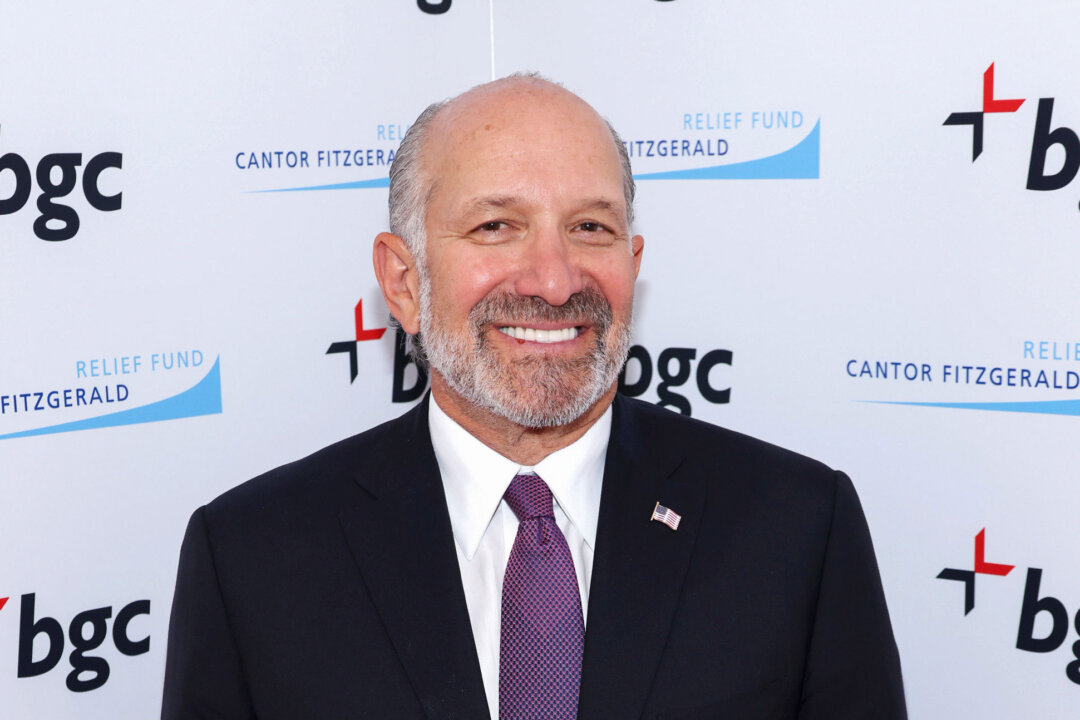The incoming commerce secretary will be integral to the president-elect’s tariff plans.
President-elect Donald Trump on Nov. 19 nominated billionaire Howard Lutnick as the commerce secretary in his incoming administration.
Trump said in a statement that Lutnick would “lead our Tariff and Trade agenda, with additional direct responsibility for the Office of the United States Trade Representative.”
Lutnick, 63, is the co-chair of the Trump-Vance transition team. He had been one of the leading contenders to succeed Janet Yellen at the helm of the U.S. Department of Treasury.
The Department of Commerce, presently headed by Gina Raimondo, will play a crucial role in Trump’s tariff plans.
On the 2024 election campaign trail, the president-elect proposed an across-the-board tariff of 10 to 20 percent on imports and levies ranging from 60 to 100 percent on goods from China.
He told CNBC that while it might raise prices on some consumer goods, it would push consumers to shift their preference to products manufactured in the United States. He also called using tariffs as a negotiating instrument a “win-win scenario.”
“Here’s the idea, you put a tariff out and say to the company, ‘Come to America, and you’re producing in America, you’re going to receive a tax credit for your tariff,” Lutnick said in an interview with the news network.
Tariffs could also be a revenue generator for the federal government, with Trump suggesting that the income tax could be eliminated in favor of trade levies.
Speaking at the Madison Square Garden rally last month, Lutnick appeared to endorse this strategy.
“When was America great?” he asked. “At the turn of the century, our economy was rocking. This is 1900, 125 years ago. We had no income tax, and all we had was tariffs.”
The Commerce Department has various sub-agencies and bureaus, including the Bureau of Economic Analysis and the Census Bureau. The Patent and Trademark Office is also an arm of the Commerce Department that regulates intellectual property rights.
Wilbur Ross served as Commerce Secretary throughout Trump’s first term in the White House.
The Senate will consider Lutnick’s nomination after the new Congress session starts on Jan. 3, 2025.
Lutnick, the chairman and CEO of investment giant Cantor Fitzgerald, had previously received endorsements for head of the treasury from some in Trump’s inner circle, including billionaire Elon Musk.
Robert F. Kennedy Jr., who Trump nominated to lead the Department of Health and Human Services, also backed Lutnick due to his support for cryptocurrency.
“Bitcoin will have no stronger advocate,” he said in a Nov. 16 post on X.In mid-August, Trump named two billionaires as co-chairs of his transition team: Linda McMahon, the former head of the Small Business Administration (SBA), and Lutnick.
As co-chair of the Trump transition team, Lutnick’s role involves selecting administration candidates, vetting personnel, and helping to craft policy.
Lutnick’s company Cantor Fitzgerald was one of the hardest-hit firms on Sept. 11, 2001. The company lost 658 employees, two-thirds of its workforce, in the terror attacks. Lutnick also lost his brother, Gary, in the attack.
Lutnick changed his usual schedule that morning to drop off his son Kyle at kindergarten, making him late for work and saving his life.
Lutnick established the Cantor Fitzgerald Relief Fund, a nonprofit organization created to help families of the company’s employees who died during the attacks.
For decades, Lutnick has been actively involved in philanthropic endeavors.
Cantor Fitzgerald and BGC Partners also host a Global Charity Day event and donate 100 percent of the day’s revenues to charity.
Over the years, Lutnick’s company has donated millions to relief and recovery efforts after natural disasters, including Hurricane Sandy in 2012 and the Oklahoma tornado in 2013.
Before the 2024 election, Lutnick maintained a low political profile, donating to Republicans and Democrats.
A long-time friend of Trump’s, the Wall Street veteran has identified a long list of the president-elect’s proposed policies he supports, such as those related to cryptocurrency, immigration, tariffs, and Israel.

